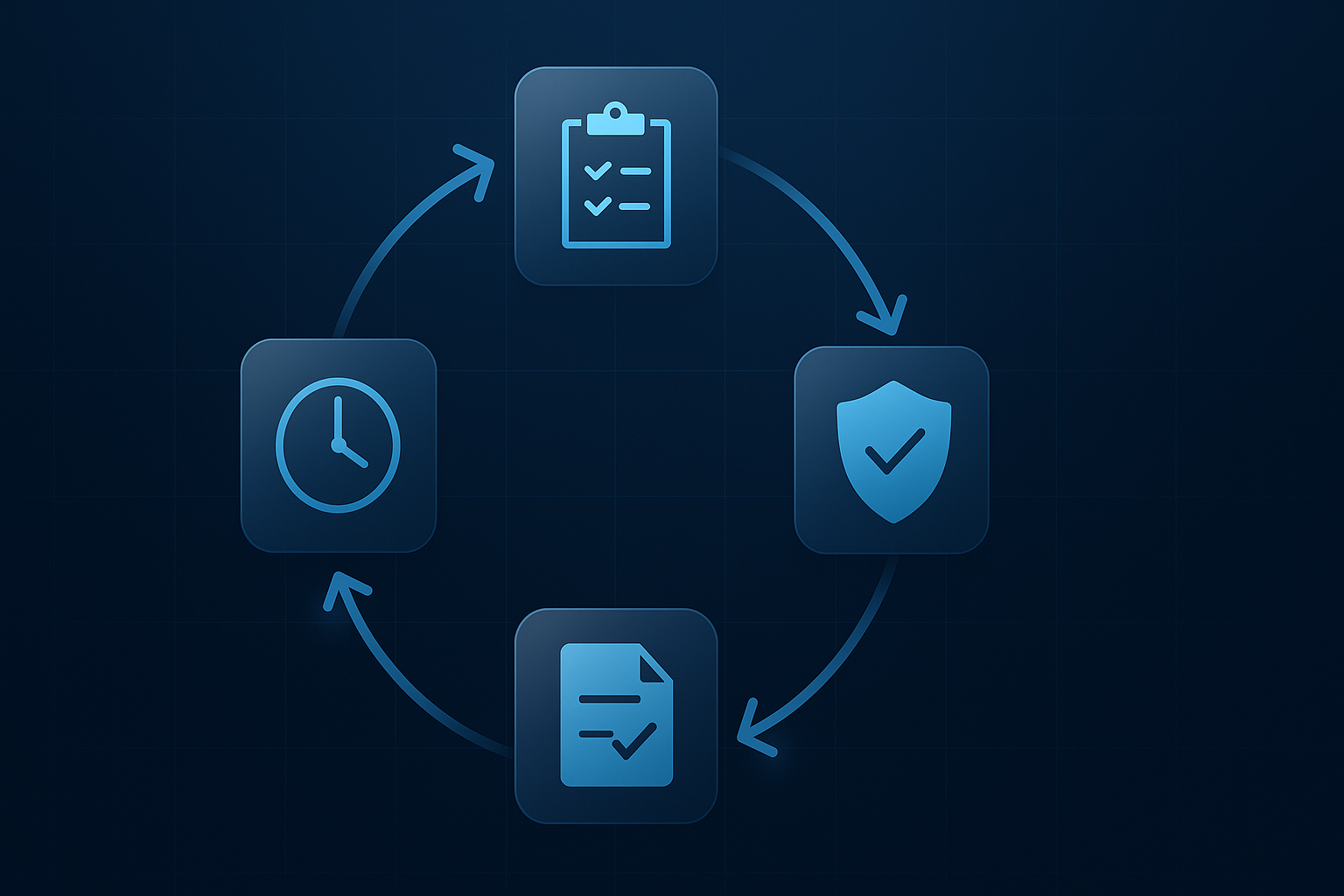Enhancing Banking Resilience Through Tabletop Exercises
In today's fast-paced financial world, banks face numerous risks. These include cyber threats, regulatory challenges, and operational disruptions. To navigate these, banks need robust risk management strategies.
Tabletop exercises offer a practical solution. They simulate real-world scenarios, allowing banks to test their responses. This helps identify weaknesses and improve strategies.
These exercises are crucial for enhancing resilience. They prepare banks for threats like ransomware and Business Email Compromise (BEC) attacks. By practicing responses, banks can reduce the impact of such incidents.
Moreover, tabletop exercises foster collaboration. They bring together different departments, enhancing communication and teamwork. This is vital for effective risk management.
Incorporating tabletop exercises into financial risk training is essential. It ensures banks are ready for any challenge.
Understanding Tabletop Exercises in Banking Risk Management
Tabletop exercises are invaluable tools in the realm of banking. They simulate potential crises in a controlled environment. This makes them ideal for assessing risk management readiness.
These exercises focus on specific scenarios relevant to banks. By doing so, they allow organizations to pinpoint vulnerabilities. This proactive approach aids in strengthening defenses.
Several core elements define effective tabletop exercises:
- Realistic scenarios tailored to the banking sector.
- Involvement of key personnel across departments.
- Clear communication and documentation of outcomes.
Through these exercises, banks can prepare for real-world threats. This preparation enhances the ability to respond swiftly and efficiently. Moreover, it highlights roles and responsibilities during crises.

by John Arano (https://unsplash.com/@johnarano)
Understanding and implementing these exercises is crucial. It ensures banks are not only prepared but also resilient. This resilience is vital in maintaining security and trust.
Key Threats Facing Financial Institutions
Banks face numerous threats in today's digital age. Cyber threats are particularly menacing. They can severely disrupt operations and undermine trust.
Specific threats include:
- Ransomware: This can cripple access to critical systems.
- Business Email Compromise (BEC) Attacks: These exploits target and deceive personnel.
- Core Banking System Outages: Such outages can halt business activities.
Additionally, regulatory non-compliance poses serious risks. Failing to adhere can lead to hefty penalties. Moreover, it can damage a bank's reputation in the market.
Understanding these threats is imperative. It allows banks to refine their risk management strategies. This proactive stance helps mitigate potential damages and ensures continued operations.
Tabletop Exercise Benefits for Banks
Tabletop exercises offer considerable benefits to banks. They simulate crisis scenarios, enhancing preparedness and response. This proactive approach reduces vulnerability to disruptions.
Increased collaboration among departments is another benefit. These exercises foster communication between IT, compliance, and risk management teams. Collaboration ensures coordinated and effective responses during actual incidents.
Key benefits include:
- Identifying weaknesses in current strategies
- Enhancing communication during crises
- Cost-effective risk management
Regular exercises also improve decision-making. Testing scenarios boost confidence in handling real-world threats. This helps maintain continuity and customer trust.

by Alexander Red (https://unsplash.com/@alexandered7)
Finally, tabletop exercises provide an opportunity for continuous learning. By regularly evaluating responses, banks can refine strategies. This ultimately fosters resilience and promotes a proactive security culture.
Designing Effective Tabletop Exercises
Creating successful tabletop exercises requires thorough planning and clear objectives. Start by identifying specific risks to test. Customizing scenarios ensures exercises are relevant and valuable.
Incorporate realistic details to simulate true crisis conditions. Consider potential impacts on operations, personnel, and technology. Comprehensive scenarios better prepare teams for actual events.
Key steps include:
- Defining clear exercise objectives
- Selecting realistic, relevant scenarios
- Engaging diverse departments
Engage participants from various departments, such as IT and compliance. Cross-functional collaboration enriches the exercise's effectiveness. Each department brings unique perspectives to addressing threats.
Post-exercise evaluation is critical. Gather feedback and conduct debriefings to analyze outcomes. Identifying strengths and areas for improvement helps refine future exercises.
Ultimately, a well-designed exercise fosters confidence and readiness. It provides a safe space to test responses and learn from mistakes without real-world consequences.
Real-World Scenarios: Ransomware, BEC Attacks, and System Outages
Ransomware attacks can cripple a bank’s operations, demanding a quick and efficient response. Tabletop exercises simulate these attacks, enabling teams to practice and plan for such crises. By doing so, banks can minimize downtime and financial loss.
Business Email Compromise (BEC) attacks exploit weak communication channels. These exercises prepare staff to recognize and respond effectively. Simulating these scenarios prevents potential breaches and secures sensitive information.
Core banking system outages disrupt customer services and trust. Tabletop exercises explore contingency plans to maintain operations during outages. By examining these scenarios, teams ensure service continuity and enhance resilience.
Typical scenarios to explore include:
- Ransomware encryption of critical data
- Phishing emails leading to BEC attacks
- Unplanned core banking outages
Effective tabletop exercises take into account these real threats. They empower financial institutions to respond swiftly and decisively. Enhanced preparedness builds a robust defense against ever-evolving cyber challenges.

by bruce mars (https://unsplash.com/@brucemars)
Integrating Tabletop Exercises into Financial Risk Training
Integrating tabletop exercises into financial risk training programs boosts preparedness. They simulate real threats and provide hands-on learning experiences. This approach ensures participants understand theoretical concepts and can apply them effectively.
Financial risk training benefits from regular tabletop exercises. They reveal gaps in current strategies and prompt improvements. This practice fosters a culture of proactive risk management within banks.
Key integration strategies include:
- Scheduling regular tabletop exercises in training curricula
- Tailoring scenarios to match specific institutional threats
- Involving multidisciplinary teams for comprehensive insights
Incorporating these exercises in training enhances decision-making and response times. This leads to a well-prepared team ready to tackle various risks. Strengthened training programs translate to improved financial resilience overall.
Best Practices for Maximizing Tabletop Exercise Impact
To maximize the impact of tabletop exercises, banks should adopt best practices that resonate with current risk challenges. These exercises must be meticulously planned and aligned with the evolving threat landscape. By leveraging tools like Opsbook, institutions can stay ahead of the curve in designing and executing these vital simulations.
Key practices for impactful exercises include:
- Involving All Relevant Departments: Bringing together diverse perspectives is crucial for comprehensive preparedness. Opsbook facilitates collaboration across various teams, ensuring every voice contributes to the planning process.
- Continuously Updating Scenarios: The threat environment is always changing. By using Opsbook's innovative features, banks can frequently refresh scenarios to reflect the latest risks, keeping their responses sharp and relevant.
- Conducting Debriefs for Immediate Feedback: Regular debriefs after each exercise capture valuable lessons learned. Opsbook's analytics tools can help banks analyze performance and identify improvement areas effectively.
Embracing these practices through Opsbook not only enhances the effectiveness of tabletop exercises but also fosters a resilient banking environment. By integrating such advanced tools, institutions can be better prepared to handle crises effectively.
Conclusion: Building a Culture of Resilience
In an increasingly complex risk landscape, building resilience is critical for financial institutions. Tabletop exercises serve as essential preparation for confronting unforeseen challenges head-on. By simulating real-world scenarios, organizations enhance their readiness and response efficiency.
To take this resilience a step further, consider incorporating Opsbook into your risk management strategy. Its innovative platform not only streamlines the execution of tabletop exercises but also promotes a culture of proactive risk management.
Adopting a proactive approach to risk management through tools like Opsbook strengthens not only the institution's defenses but also builds trust with clients and stakeholders. As banks regularly integrate tabletop exercises into financial risk training via Opsbook, they remain agile and equipped to face future threats, ensuring continued stability and success.threats head-on.






